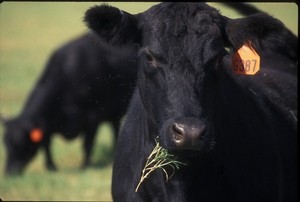FAO enlists Swiss expertise in BSE fight
Swiss experts to improve global BSE surveillance measures after a
spate of recent bad publicity.
The organisation aims to improve methods of diagnosis, surveillance and prevention in order to win back consumer trust after a number of highly-publicised cases of BSE.
"Switzerland had its first case of BSE in 1990 and peaked at 68 cases in 1995," said Speedy. "There were just three cases in 2004, demonstrating how effectively the system has worked in Switzerland."
The FAO claims that Switzerland has a fool-proof system of cattle identification and registration, along with a scientific testing programme, preventative measures in the rendering and animal feed industry and complete support throughout the food chain.
Essential control measures put in place include the exclusion of potentially infective materials (Specified Risk Materials or SRMs) from the food and feed chain and improved practices in the rendering and feed industries. "It is not sufficient just to ban meat and bone meal from ruminant feeds," said Speedy.
"Cross contamination can occur in the feed mills, as well as during transport and on the farm. It was shown in Switzerland that a total ban on MBM was necessary to prevent transmission of infective material."
Alternatively, pig and poultry lines must be kept entirely separate in feed mills. The FAO is urging countries to apply the same safety measures.
The spectre of BSE has hit meat processors hard. Even though the FAO insists that the few cases of BSE in cattle in Canada and the US and the single case of BSE recently confirmed in a goat in France should not cause panic among meat processors and consumers, the beef sector is still in a slump.
A Wall Street Journal Online/Harris Interactive Health-Care Poll in the US last year showed that one in every five American adults - 21 per cent - said that fear of mad cow disease would change their eating habits, while 78 per cent of these people said that they would eat less beef.
Some 16 per cent indicated that they would stop eating beef altogether.
The slump is being felt all the way up to the world's largest processors. Tyson for example reported poor first fiscal quarter results last week. Operating income was $129 million compared to $161 million and net income was $48 million compared to $57 million for the same period last year.
In addition, the temporary suspension of operations at some Tyson Foods beef plants is set to continue through 12 February and may extend beyond that date, underlining the ongoing precarious state of the global beef industry.
The worst thing that could happen though would be a rerun of the BSE crisis that gripped the UK in the late 1990s. Domestic sales of beef products declined immediately by 40 per cent following reports of a possible link between BSE and new variant CJD - a human form of BSE - in 1996. Export markets were completely lost.
However the FAO insists that BSE surveillance and detection is now much better. The organisation points out that the recent cases in the US and Canada were brought to light in the first place because of the stringent testing procedures that are now in place.
More than 176 000 tests out of a total cattle population of almost 95 million have been carried out in the USA and more than 21 000 out of 14.5 million cattle in Canada during 2004. A ban on feeding ruminant protein to ruminants has been in place in both countries since 1997.
In addition, the recent case of the infected goat in France was only confirmed by molecular phenotyping and a two-year bio-assay, which found the infection as indistinguishable from a BSE infection.
BSE is a fatal disease of adult cattle characterised by degeneration of the central nervous system. The causative agent is thought to an abnormal form of a protein called a 'prion'. It was first diagnosed in cattle in the United Kingdom in 1986. The transmission of BSE is thought to be by the oral ingestion of animal feed containing BSE-infected meat and bone meal (MBM).






